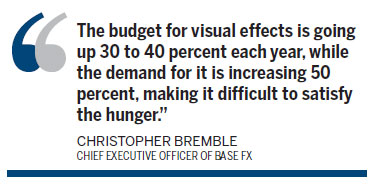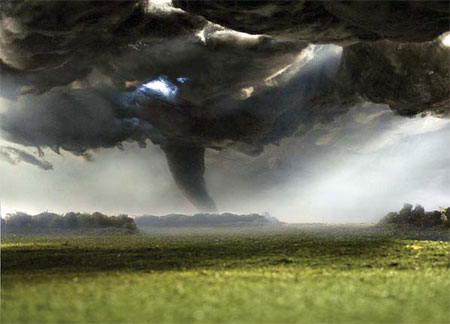Base FX has a visible effect on the Chinese movie industry
|
A visual effect by artist Matthew Albanese using spices, cotton wool and grout. Domestic movie directors and investors are now attaching increasing importance to visual effects and are willing to pay more for them. Provided to China Daily |

Christopher Bremble keeps a very busy schedule every day, from holding meetings to negotiating with his clients. His decision to start a visual effects company in China six years ago proved quite right, as can be seen from the number of deals China's flourishing film industry has brought his company.
Established in 2006, Base FX is a visual effects company located in Beijing's Sanlitun area. Bremble, its chief executive officer, comes from the United States and used to work in Hollywood, while 95 percent of its team is Chinese.
The studio is currently working on 14 film projects, among which six are domestic productions.
"We are always trying to increase the portion of Chinese films, because I want to localize my company," said Bremble. The proportion of domestic films among its film clients has grown close to 50 percent from about 20 percent when it was set up.
As a visual effects provider which has worked with Chinese directors including Zhang Yimou, Chen Kaige and Gordan Chan, Base FX has witnessed the change in the Chinese movie industry's investment in post-production.
"The budget for visual effects is going up 30 to 40 percent each year, while the demand for it is increasing 50 percent, making it difficult to satisfy the hunger," said Bremble.
Directors always want a lot while the producers say there is a limited budget, so Bremble's job is to use all the available resources in a cost-effective way.
"Domestic investment in this field generally varies from hundreds of thousands of yuan to millions of yuan," said Xie Ning, vice-president of Base FX.
The cost of visual effects in Chinese movies takes up just 5 to 10 percent of the total budget, far less than that in Hollywood productions, where it usually ranges between 15 and 30 percent, sometimes even rising to 80 percent, as it did for the blockbuster Transformers.
However, there are some exceptions in China, such as Feng Xiaogang's Aftershock in 2010, a blockbuster that took in 660 million yuan ($105 million) at the box office. Its visual effects cost 30 million yuan, accounting for more than 15 percent of the whole investment, said Wu Yan, general manager of Technicolor (Beijing) Visual Technology Co Ltd, a joint venture that took part in the film's visual effects production.
"In China, the film industry is still very much a star-based film industry, and the visual effect is just a tool, playing the supporting role," said Bremble.
"But in the West, it plays a primary role. Hollywood movies' ambitions are more global, and visual effects help to translate them to every market."
As the industry is just in the initial stage of development, the mechanism for undertaking the film visual effects business is different from that in Hollywood.
Since most Chinese directors and producers don't have much idea about this field, including how it works and the advantages of different visual effects studios, the modus operandi is that film producers outsource the total work to one company. In comparison, in Hollywood, film producers are in charge of the distribution of visual effects work, so they directly contact several studios, allocating specific work to specific visual effect providers, since they know exactly what their strengths are in terms of skills, according to Xie.
"For us, we would consider outsourcing part of the work to overseas studios on the condition that the budget allows this, and the technology required is more than we could afford," said Wu.
A British studio - Moving Pictures Company - was responsible for the earthquake scene in Aftershock.
"The current problem for the industry is the shortage of professionals with experience in this field," Wu said.
He added that while the gap in technology can almost be ignored as it's not difficult to overcome, finding people with the skills to operate the equipment is what matters most.
Bremble and his team at Base FX have conducted lectures at Chinese universities and colleges over the past 18 months, including China Academy of Art, Huazhong University of Science and Technology and Northeastern University.
In the talks to students on animation, Bremble and his team sought to outline what Base FX does and the requirements of the industry.
"Getting young people excited about what we do and understand the industry, as well as training those who show potential to be creative professionals are the two major challenges facing us," Bremble said.
Although China's movie post-production market is not growing as fast as that of the whole industry, it is developing steadily as growing numbers of directors and producers want to add visual effects to their work, Wu said.
In terms of the prospects for making money in the field, both Xie from Base FX and Wu from Technicolor said that they currently just break even, as the profits they earn from projects are soon reinvested in the renewal of equipment and upgrading technology.
"I am rather positive about the industry's future in China, because, with the maturing of the market, investors will be willing to put more capital into visual effects," Wu said, "And then everything will be different."
huangying@chinadaily.com.cn
(China Daily 03/26/2012 page13)















